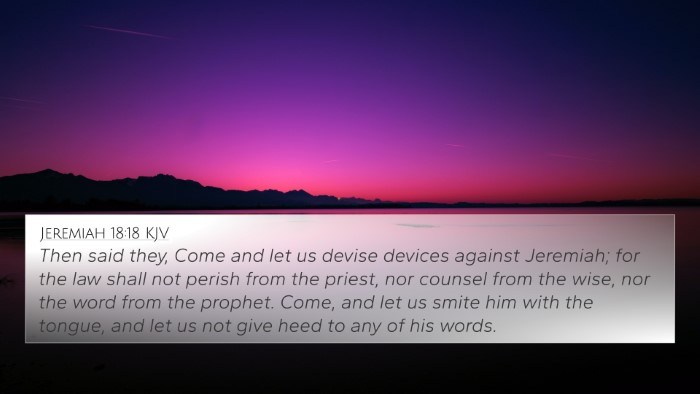This section features a detailed cross-reference designed to enrich your understanding of the Scriptures.
Below, you will find carefully selected verses that echo the themes and teachings related to Jeremiah 44:16 KJV. Click on any image to explore detailed analyses of related Bible verses and uncover deeper theological insights.
 Luke 19:27 (KJV) »
Luke 19:27 (KJV) »
But those mine enemies, which would not that I should reign over them, bring hither, and slay them before me.
 Job 21:14 (KJV) »
Job 21:14 (KJV) »
Therefore they say unto God, Depart from us; for we desire not the knowledge of thy ways.
 Exodus 5:2 (KJV) »
Exodus 5:2 (KJV) »
And Pharaoh said, Who is the LORD, that I should obey his voice to let Israel go? I know not the LORD, neither will I let Israel go.
 Daniel 3:15 (KJV) »
Daniel 3:15 (KJV) »
Now if ye be ready that at what time ye hear the sound of the cornet, flute, harp, sackbut, psaltery, and dulcimer, and all kinds of musick, ye fall down and worship the image which I have made; well: but if ye worship not, ye shall be cast the same hour into the midst of a burning fiery furnace; and who is that God that shall deliver you out of my hands?
 Jeremiah 11:10 (KJV) »
Jeremiah 11:10 (KJV) »
They are turned back to the iniquities of their forefathers, which refused to hear my words; and they went after other gods to serve them: the house of Israel and the house of Judah have broken my covenant which I made with their fathers.
 Jeremiah 18:18 (KJV) »
Jeremiah 18:18 (KJV) »
Then said they, Come and let us devise devices against Jeremiah; for the law shall not perish from the priest, nor counsel from the wise, nor the word from the prophet. Come, and let us smite him with the tongue, and let us not give heed to any of his words.
 Jeremiah 11:8 (KJV) »
Jeremiah 11:8 (KJV) »
Yet they obeyed not, nor inclined their ear, but walked every one in the imagination of their evil heart: therefore I will bring upon them all the words of this covenant, which I commanded them to do: but they did them not.
 Jeremiah 8:6 (KJV) »
Jeremiah 8:6 (KJV) »
I hearkened and heard, but they spake not aright: no man repented him of his wickedness, saying, What have I done? every one turned to his course, as the horse rusheth into the battle.
 Jeremiah 16:15 (KJV) »
Jeremiah 16:15 (KJV) »
But, The LORD liveth, that brought up the children of Israel from the land of the north, and from all the lands whither he had driven them: and I will bring them again into their land that I gave unto their fathers.
 Jeremiah 38:4 (KJV) »
Jeremiah 38:4 (KJV) »
Therefore the princes said unto the king, We beseech thee, let this man be put to death: for thus he weakeneth the hands of the men of war that remain in this city, and the hands of all the people, in speaking such words unto them: for this man seeketh not the welfare of this people, but the hurt.
 Jeremiah 8:12 (KJV) »
Jeremiah 8:12 (KJV) »
Were they ashamed when they had committed abomination? nay, they were not at all ashamed, neither could they blush: therefore shall they fall among them that fall: in the time of their visitation they shall be cast down, saith the LORD.
 Isaiah 3:9 (KJV) »
Isaiah 3:9 (KJV) »
The shew of their countenance doth witness against them; and they declare their sin as Sodom, they hide it not. Woe unto their soul! for they have rewarded evil unto themselves.
 Psalms 73:8 (KJV) »
Psalms 73:8 (KJV) »
They are corrupt, and speak wickedly concerning oppression: they speak loftily.
 Job 15:25 (KJV) »
Job 15:25 (KJV) »
For he stretcheth out his hand against God, and strengtheneth himself against the Almighty.
 Luke 19:14 (KJV) »
Luke 19:14 (KJV) »
But his citizens hated him, and sent a message after him, saying, We will not have this man to reign over us.


















